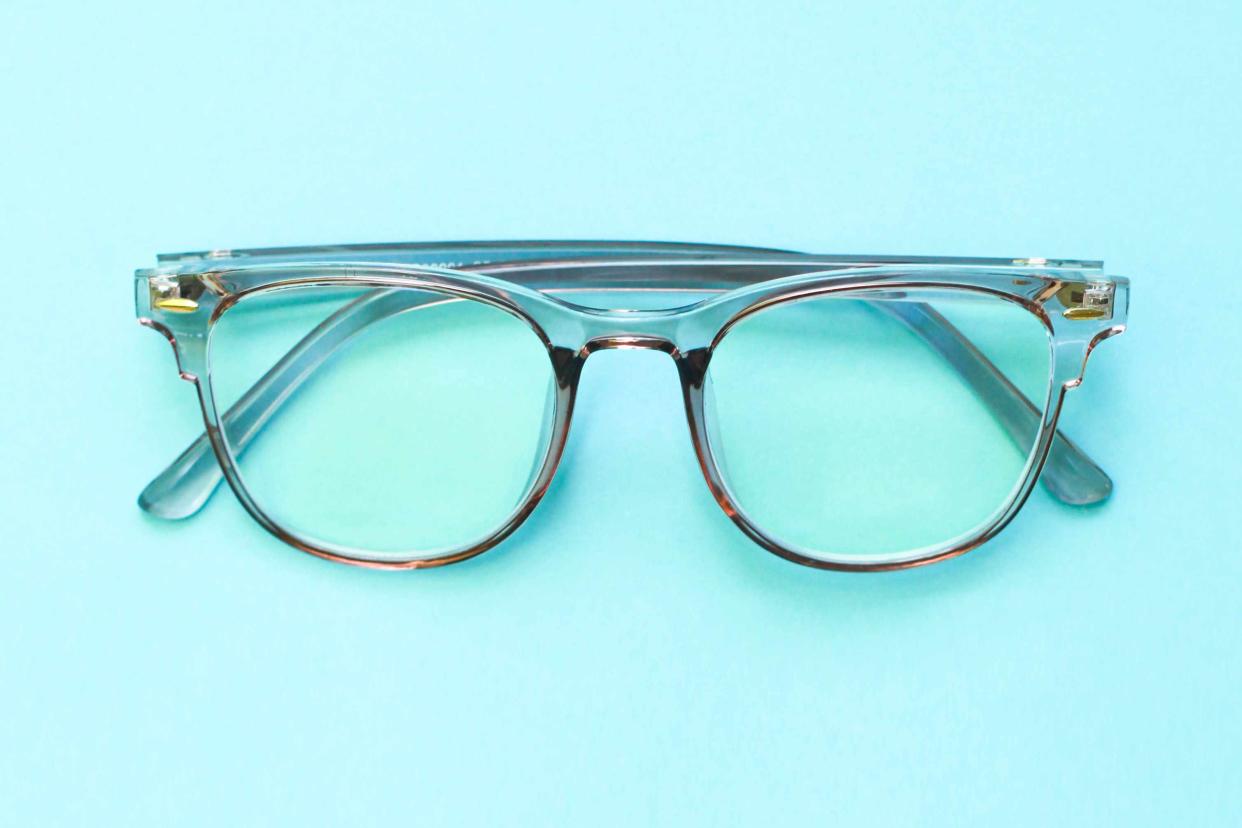Those Blue-Light Glasses Aren’t Doing Much for Your Eyes, Study Finds

You’re better off taking more frequent screen breaks than buying new frames.
Blue-light-blocking glasses are marketed as a smart and convenient way to protect tired, overworked eyes, claiming to help filter out the harmful blue light emitted from tech screens, as well as fluorescent and LED lights. But buying yourself a fun pair of frames is likely not the answer to your eye-strain (or sleep-deprivation) woes.
A study published last week in Cochrane Database of Systematic Reviews found little to no evidence (or indeterminate evidence) that wearing blue-light glasses was any more effective than wearing non-blue-light-blocking glasses at decreasing eye-strain symptoms, improving vision performance and ability, or boosting sleep quality or daytime alertness, after looking at screens.
“We found there may be no short-term advantages with using blue-light-filtering spectacle lenses to reduce visual fatigue associated with computer use, compared to non-blue-light-filtering lenses. It is also currently unclear whether these lenses affect vision quality or sleep-related outcomes, and no conclusions could be drawn about any potential effects on retinal health in the longer term. People should be aware of these findings when deciding whether to purchase these spectacles,” said the review’s senior author, Laura Downie, PhD, associate professor and research laboratory head at the University of Melbourne in Australia, in a news release.
Many of the symptoms associated with long hours of looking at various digital screens at close range—headaches, dry eyes, eye pain and strain, dizziness, blurry vision, even full-blown nausea—can be attributed not to blue-light exposure, but to what’s known as computer vision syndrome, or digital eye strain (read more about that here). The best way to prevent that dreaded eye strain is to follow the 20-20-20 rule: every 20 minutes, look at something 20 feet away for 20 seconds. This lets your eyes (and vision center of your brain) take a much-needed break from looking at something close up, which requires a lot of effort. (These brief, but frequent screen breaks will likely benefit your mental and physical health as well).
Related: It's Not Just You: Constantly Being Online Impacts Everyone's Mental Health
According to the American Macular Degeneration Foundation (AMDF), exposure to blue light is known to be harmful to eye health, increasing the risk for macular degeneration onset or progression, and other diseases like cataracts. However, most people do not realize (or are intentionally misled by marketing not to realize) that “the blue light emitted from the sun and the blue light emitted from electronic devices are significantly different,” the AMDF explains.
“The amount of blue light our eyes receive from artificial sources, such as computer screens, is about a thousandth of what we get from natural daylight,” explains study researcher Singh Sumeer Singh, PhD, a postdoctoral clinical research fellow in the Downie Laboratory. It’s also worth bearing in mind that blue-light-filtering lenses typically filter out about 10 to 25 percent of blue light, depending on the specific product.”
This doesn't necessarily mean that screen-emitted blue light is nothing to be concerned about. It's still smart to shut down devices and give your system a chance to unwind, without blue light or other audio/visual/mental stimulation, especially as bedtime approaches.
Related: 10 Things You Can Do Before Bed to Sleep Better at Night, According to Sleep MDs
All of that said, Downie and her fellow researchers do note that longer and more in-depth clinical research is required to get a better sense of blue-light glasses' potential effects for visual performance, sleep quality, and eye health. Plus, the study did not find any significant, severe, or consistent downsides to wearing blue-light lenses. If you personally like your blue-light frames and feel strongly that they make it easier for you to bear long days in front of a screen, there is no harm in continuing to wear them! But this evidence is definitely something to consider before buying yourself a shiny new thing with unsubstantiated health claims.
Related: Time for a Digital Declutter: 8 Simple Ways to Cut Screen Time
For more Real Simple news, make sure to sign up for our newsletter!
Read the original article on Real Simple.

